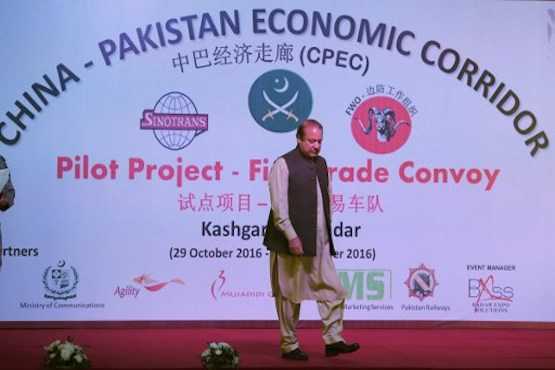
Pakistan's Prime Minister Nawaz Sharif leaves the stage after speaking at a ceremony in Gwadar Nov. 13, 2016, after opening a trade route linking the southwestern port to the Chinese city of Kashgar as part of a joint multi-billion dollar project to jump start economic growth. (Photo by AFP)
Arshad Hussain, 28, is a resident of Lyari — Karachi's oldest suburb and home to mostly lower middle class families. On Nov. 12 last year tragedy struck when Hussain lost three family members, including Samreen, his younger sister and Shahar Bano, his aunt, in a deadly blast at a Sufi shrine.
The Shah Noorani Shrine is located in a remote and hilly area of Khuzdar district in Pakistan's Balochistan province, which has been racked by violence in recent months.
Recalling the memory of his younger sister, Hussain struggles through his words. "Samreen was standing along with the other women watching the dhamaal [sufi dance]. She was very happy there."
"A young man advanced towards the middle of the dhamaal area shouting 'Allahu Akbar' (God is Great). We responded to his slogan with religious passion. He shouted the same slogan and we were about to answer it when all of a sudden there was a formidable explosion."
Wiping tears with his bare hands Hussain continues. "After the blast, it was completely dark with smoke. There were loud painful screams of women and children. After I recovered, I found bodies scattered where the mystical ritual dance had been in progress only moments ago."
"The very first person I thought of was Samreen. I was filled with horror. I turned over the body of a person lying close. It was not my sister. I overturned another body and heaved a sigh of relief that it was not Samreen's."
As Hussain speaks it is as if he has slipped back into that horrific moment. "Before turning over another body, I had an indescribably strong feeling that the third one would be Samreen." He could not speak any further.
The shrine blast was the third major attack in Balochistan in four months.
Some three weeks earlier on Oct. 24, three heavily armed terrorists stormed a police training college in Quetta, the provincial capital, killing 61 cadets and injuring more than 165 others.
The Islamic State of Iraq and the Levant — Khorasan Province claimed responsibility for the attack in collaboration with an anti-Shia group, Lashkar-e-Jhangvi.
In a statement the Pakistan army said the assailants came from Afghanistan and were in contact with their handlers there.
On Aug. 8, terrorists attacked a government-run hospital in Quetta, killing 94 people and leaving over 120 people injured. Most of those killed were lawyers who had rushed to the hospital after Bilal Anwar Kasi, President of the Balochistan Bar Association, was brought to the facility suffering gunshot wounds. He was pronounced dead on arrival. The Islamic State and a Taliban splinter group claimed responsibility for the carnage.
There has been a surge in terror attacks in Balochistan over the past year, leaving nearly 500 people dead. Over 155 separate incidents have taken place in the province in addition to a rampant number of abductions.
The spike in violence in Pakistan's impoverished but resource-rich province has raised questions about the causes.
Pakistan's provincial and military officials blame foreign elements, particularly neighboring India. They point to Indian Prime Minister Narendra Modi's support for ethnic Baloch separatists and accuse India of trying to undermine China's One Belt, One Road initiative. This economic program aims to create a corridor from Beijing to the markets of Africa and the oil fields of the Middle East through Pakistan.
Beijing's US$46-billion dollar project has been warmly received by Pakistan. As part of the initiative Pakistan and China have agreed to a huge, nationwide project — the China Pakistan Economic Corridor (CPEC) — which will lay some 3,000-kilometers of roads and railways to connect Pakistan's Gwadar Port with China's far north-western city of Kashgar.
Ever since the project took center stage for Pakistan's future economic prospects, Balochistan has reeled under violence.
Balochistan Home Minister Mir Sarfaraz Ahmed Bugti also points to foreign interference behind the growing number of terrorist attacks in the country's largest province.
"The arrest of a serving Indian naval officer Kul Bhushan Yadav in Balochistan is substantial proof that external elements are stoking violence to undermine the China Pakistan Economic Corridor," he said.
"The Jihadi groups are mere tools at the hands of our enemies who are bent upon destabilizing Pakistan and Balochistan. But we remain undeterred by such tactics and will do all what is needed to complete the economic corridor," he said.
Professor Hasan Askari Rizvi, Pakistan's most prominent military analyst and political scientist, says speculation or statements are not enough to prove India's direct or indirect link to the violence.
"All those arrested are either Pakistanis or Afghani and they are all the same ideologically. External forces can only provide funds and that too is yet to be established in any competent court of law," he said.
"The government hasn't shared any evidence or dossier either to prove the involvement of foreign hands. But nonetheless, the CPEC could still be a factor behind the attacks," he said.
Askari feels that jihadis may be trying to achieve twin objectives on ideological as well as economic fronts.
"They are choosing Balochistan as a target to tell authorities they still have the capability of striking Pakistan despite the Zarb-e-Azb Operation," he said referring to a military campaign targeting militant groups.
"And any attack in Balochistan, they know, undermines CPEC and hurts Pakistan, given the high stakes involved," he said.


